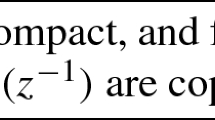Abstract
We consider robust adaptive control designs for relative degree one, minimum phase linear systems of known high frequency gain. The designs are based on the dead-zone and projection modifications, and we compare their performance w.r.t. a worst case transient cost functional with a penalty on the \(\mathcal{L}\) ∞ norm of the output, control and control derivative. We establish two qualitative results. If a bound on the \(\mathcal{L}\) ∞ norm of the disturbance is known and the known a priori bound on the uncertainty level is sufficiently conservative, then it is shown that a dead-zone controller outperforms a projection controller. The complementary result shows that the projection controller is superior to the dead-zone controller when the a priori information on the disturbance level is sufficiently conservative.
Similar content being viewed by others
References
Egardt B (1979) Stability of adaptive controllers. Lecture notes in control and information sciences. Springer, Berlin Heidelbergh New York
French M (2002) An analytical comparison between the nonsingular quadratic performance of robust and adaptive backstepping designs. IEEE Trans on Automat Control 47(4):670–675
Georgieva P, Ilchmann A (2001) Adaptive λ-tracking control of activated sludge processes. Int J Control 74:1247–1259
Ilchmann A (1991) Non-identifier-based adaptive control of dynamical systems: a survey. IMA J Math Control Inform 8:321–366
Ilchmann A (1993) Non-identifier-based high-gain adaptive control. Lecture notes in control and information sciences. Springer, Berlin Heidelberg New York
Ilchmann A, Ryan EP (1994) Universal λ-tracking for nonlinearly perturbed systems in the presence of noise. Automatica 30:337–346
Ilchmann A, Townley S (1999) Adaptive sampling control of high-gain stabilizable systems. IEEE Trans Automat Control 44(10):1961–1966
Kreisselmeier G, Narendra KS (1982) Stable model reference adaptive control in the presence of bounded disturbances. IEEE Trans Automat Control 27(6):1169–1175
Kristic M, Kanellakopoulos I, Kokotovic P(1995) nonlinear and adaptive control design. Wiley, New York
Lee KW, Khalil HK (1997) Adaptive output feedback control of robot manipulators using high-gain observer. Int J Control 67(6):869–886
Logemann H, Townley S (1997) Adaptive stabilization without identification for distributed parameter systems: An overview. IMA J Math Control Inform 20:175–206
Mårtensson B (1985) The order of any stabilizing regulator is sufficient a priori information for adaptive stabilization. Syst Control Lett 6:87–91
Narendra KS, Annaswamy AM (1989) Stable adaptive systems. Prentice-Hall, Englewood Cliffs
Peterson BB, Narendra KS (1982) Bounded error adaptive control. IEEE Trans Automat Control 27(6):1161–1168
Ryan EP (1991) A universal adaptive stabilizer for class of nonlinear systems. Syst Control Lett 16:209–218
Sanei A (2002) Towards a performance theory of robust adaptive control. PhD thesis, Department of Electronics and Computer Science, University of Southampton, UK
Sanei A, French M (2004) Towards a performance theory of robust adaptive control. Int J Adapt Control signal Process 18:403–421
Townley S (1996) Topological aspects of universal adaptive stabilization. SIAM J Control Optim 34:1044–1070
Vidyasagar M (1978) Nonlinear systems analysis. Prentice-Hall, Englewood Cliffs
Willems JC, Byrnes CI (1984) Global adaptive stabilization in the absence of information on the sign of the high-frequency gain. Lecture notes in control and information science. Springer, Berlin Heidelberg New York, 62:49–57
Xie C, French M (2004) A performance comparison between two design techniques for non-linear output feedback control. Int J Control 77:264–276
Author information
Authors and Affiliations
Corresponding author
Rights and permissions
About this article
Cite this article
Sanei, A., French, M. A performance comparison of robust adaptive controllers: linear systems. Math. Control Signals Syst. 18, 369–394 (2006). https://doi.org/10.1007/s00498-006-0005-1
Received:
Revised:
Published:
Issue Date:
DOI: https://doi.org/10.1007/s00498-006-0005-1



